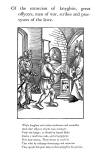Alexander Barclay and “The Ship of Fools”
ca 1519.
Countering the rapaciousness of some clerics and criticising both them and the dissolute ways of the general populace, were the satirists. Chief among them must be ranked Alexander Barclay a monk, possibly of Scots origin, who had seen for himself how the church had fallen. In later life he held two livings – the vicarage of Much Badew (Baddow) in Essex, and that of Saint Mathew at Wo(o)key, Somerset. His particular work of note was “The Ship of Fools” a translation of the Narrenschiff
(first published in 1494 by the German Sebastian Brandt) that consisted of morality tales, prose and poetry, about the follies of human nature. Although not excessively biting by modern standards, the innovation of public comment amused, educated and warned the reader and is as apposite today as it was over 500 years ago. Both the German original and Barclays translation ca 1519 with additions, were illustrated with wood cuts – always popular with the people. original and Barclays translation ca 1519 with additions, were illustrated with wood cuts – always popular with the people.
In the print (right) the lawyer arrives to serve notice or warrant for debt – even in the 15
and 16 centuries the lawyers were coining it. Importantly the books were written in the common or vulgar tongue and found great popularity among the lower classes. The educational value of the works were enhanced by inclusion of the sources for references, many of which stemmed from classical writers and from the Bible, usually the Old Testament. Significantly the people were beginning to have access to more and more printed matter, not just the bible, such that books like this and later
Bunyan’s Pilgrims Progress, became vehicles for influencing opinion.
The story line of
Alexander Barclay`s The Ship of Fools consists of several shiploads of fools of all kinds being carried to their native country, who are
“reproved in a liberal spirit, with noble earnestness, true moral feeling, and practical common sense. The poet attacks with noble zeal the failings and extravagances of his age, and applies his lash unsparingly even to the dreaded Hydra of popery and monasticism, “
Relatively gentle in his satire,
Barclay nevertheless has something to say about the state of the Church and
is an invaluable contemporary comment of the early sixteenth century.
Specific stories relating to the Church include a quite lengthy
“Of the ruyne, inclynacion and
decay of the holy fayth catholycke, and dymynucion of the Empyre. “
“Of the falshode of Antichrist.”
“Of hym that dare nat vtter the
trouth for fere of displeasour or punyshement.” [
Pdf file ]
These works were highly popular during the late fifteenth and through the sixteenth century; with them was born the `power of the press.`
16C England
18/07/2011
|